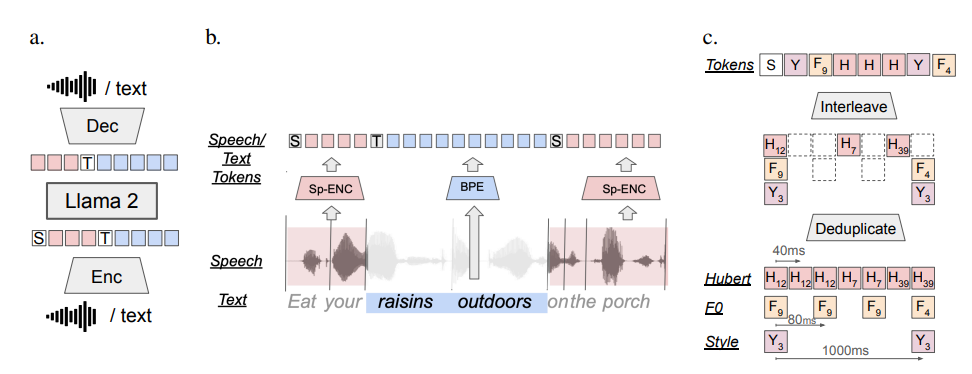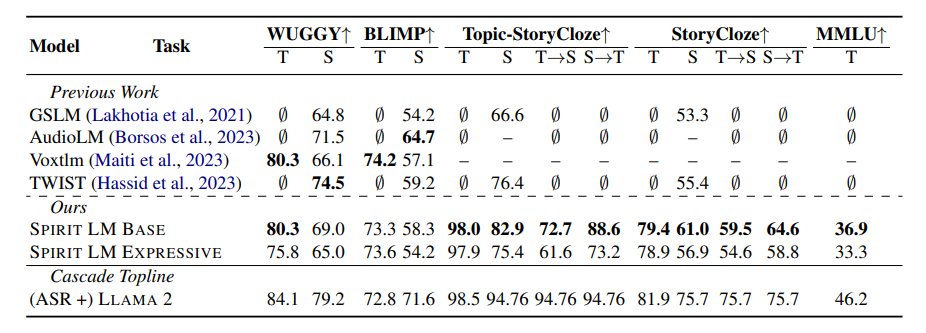Meta AI recently open sourced a multi-modal language model called SPIRIT LM. This is a powerful tool that can freely mix text and speech. It is based on a pre-trained text language model with 7 billion parameters and is extended to speech modality through continuous training. . SPIRIT LM can not only understand and generate text and speech, but more importantly, it can mix the two to achieve multiple functions such as speech recognition, speech synthesis, speech classification, etc. It is especially good at emotional expression and can generate more natural and emotional voice, thanks to the design of its two versions: "Basic Edition" and "Expression Edition".
Meta AI has recently open sourced a basic multi-modal language model called SPIRIT LM, which can freely mix text and speech, opening up new possibilities for multi-modal tasks of audio and text.
SPIRIT LM is based on a 7 billion parameter pre-trained text language model and extends to speech modalities through continuous training on text and speech units. It can understand and generate text like a large text model, and it can also understand and generate speech. It can even mix text and speech together to create various magical effects! For example, you can use it for speech recognition, and Convert speech into text; you can also use it for speech synthesis to convert text into speech; you can also use it for speech classification to determine what emotion a piece of speech expresses.

What's even more powerful is that SPIRIT LM is also particularly good at "emotional expression"! It can recognize and generate a variety of different voice intonations and styles, making the AI's voice sound more natural and emotional. You can imagine that the voice generated by SPIRIT LM is no longer the cold machine voice, but like a real person speaking, full of joy, anger, sorrow and joy!
In order to make AI better "emotional", Meta researchers have also specially developed two versions of SPIRIT LM:
"Basic Edition" (BASE): This version mainly focuses on the phoneme information of speech, which is the "basic composition" of speech.
"Expressive version" (EXPRESSIVE): In addition to phoneme information, this version also adds tone and style information, which can make the AI's voice more vivid and expressive.

So, how does SPIRIT LM do all this?
Simply put, SPIRIT LM is trained based on LLAMA2, a super powerful text large model previously released by Meta. The researchers "fed" a large amount of text and speech data to LLAMA2 and adopted a special "interleaved training" method so that LLAMA2 can learn the rules of text and speech at the same time.
In order to test SPIRIT LM's "emotional expression" ability, Meta researchers also designed a new test benchmark - the "Speech-Text Sentiment Preservation Benchmark" (STSP). This test benchmark contains a variety of speech and text prompts expressing different emotions to test whether the AI model can accurately recognize and generate speech and text with corresponding emotions. The results show that the "expression version" of SPIRIT LM performs well in emotion retention and is currently the first AI model that can retain emotional information across modalities!
Of course, Meta researchers also admitted that SPIRIT LM still has many areas for improvement. For example, SPIRIT LM currently only supports English and needs to be expanded to other languages in the future; the model scale of SPIRIT LM is not large enough, and it is necessary to continue to expand the model scale and improve model performance in the future.
SPIRIT LM is Meta's major breakthrough in the field of AI. It opens the door for us to the "sounding and emotional" AI world. I believe that in the near future, we will see more interesting applications developed based on SPIRIT LM, so that AI can not only speak eloquently, but also express emotions like real people, and communicate with us more naturally and cordially!
Project address: https://speechbot.github.io/spiritlm/
Paper address: https://arxiv.org/pdf/2402.05755
All in all, the open source of SPIRIT LM brings new opportunities for the development of multi-modal AI. Its powerful emotional expression capabilities and cross-modal information processing capabilities herald future innovations in the way AI interacts with humans. We look forward to SPIRIT LM being implemented in more languages and application scenarios in the future.